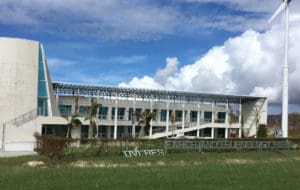
The University of the Virgin Islands Board of Trustees approved the university’s new strategic plan, “Greatness Through Innovation,” during its scheduled board meeting Saturday, marking the end of the last six years of following its previous strategic plan, “Pathways to Greatness.”
“I am optimistic that we will do well,” said UVI President David Hall. “These are more ambitious plans because of this whole focus on innovation, where we are really asking everyone in the institution to think about doing things differently, not just getting it done, but are we doing it in the most creative and innovative way possible?”
Among the highlights of the “Greatness Through Innovation” plan are pursuing free tuition for V.I. residents and contributing to vocational and technical education in the territory. According to Hall, the university also seeks to increase student engagement in research being conducted at UVI and improve financial aid for non-resident and graduate students who incur greater tuition costs than resident undergraduates.
The plan also highlighted the development of a memorandum of understanding linking UVI’s Virgin Islands Center for Caribbean Culture with the Smithsonian Institution’s Museum of African American History.
This fiscal year, UVI has a $34.8 million recommended budget from the local government, the highest level of appropriation since 2009. To carry out the new five-year strategic plan, UVI would need to expend $73 million, including the rebuilding of its St. Thomas and St. Croix campuses, a project expected to cost some $45 million. The free-tuition policy – at $3 million a year – would cost the university $15 million over five years.
The rest of the needed funding would have to come from fundraising efforts, donations and, Hall hopes, some additional funding from the local government.
All present voting board members were in favor of adopting the new strategic plan: Chairman Henry Smock, Vice Chairman Alexander Moorhead and members Dara Hamilton, Jacqueline Sprauve, Yvonne Thraen, John Quelch and Wesley Williams, who was present via teleconference. Education Commissioner Sharon Ann McCollum, an ex-oficio member, was also present.
Meanwhile, the previous strategic plan, “Pathways to Greatness,” was originally a five-year plan that was extended by one year to allow the university to incorporate Middle State accreditors’ input into the new plan. UVI managed to complete 73 percent of its measurable objectives, according to Hall, in spite of the fact that the university took a beating on two fronts: the 2017 hurricanes and a huge drop in budget allocation.
“We lost $9 million in appropriations and another $9 million in allotment,” said Hall. “Our budgets were hit very hard during that same time period and yet we were still able to achieve 73 percent of the measurable objectives under that plan.”
UVI also failed to reach the 3,000-student enrolment mark it had set for itself in the previous plan, according to Hall; latest enrolment numbers stand at roughly 2,000, partly due to the post-hurricane exodus of many UVI students. The objectives the university failed to achieve in the prior strategic plan were incorporated into the new plan, according to Hall.
Infrastructure Recovery
Eight buildings went offline on the St. Croix campus after the hurricanes, according to Hall. Through insurance proceeds, UVI has made it through most of the reconstruction work on its West Hall building, which should be operational in a few weeks, said Hall.
As for the other seven buildings, UVI’s plans to rebuild them depend on resources from its insurance company, the Federal Emergency Management Agency, and the Department of Education, according to Hall. With the exception of the marine science building, the repairs of which are projected to be completed in mid-2020, the remaining six buildings are expected to be up and running by the end of 2019.
Nereida Washington, director of campus operations on St. Croix, went into detail on the shuffling of departments they had to do because of hurricane damage. The College of Science and Mathematics, she said, was removed from its original location inside the Research and Technology Park and transferred to the Evans Center, and made arrangements so students could have a makeshift wet lab.
The Agriculture Experiment Station, along with its six greenhouses and storage area, also took severe damage, according to Washington.
“I don’t have the actual timeline,” said Washington about the rebuilding of the AES. “We are working on it as a priority now, a year after, to start that process of getting the request for proposals ready so we can get bids.”
The St. Croix residence hall’s second story also suffered dropped ceilings and torn fixtures, but the repairs for the building were finished last November in order to accommodate students faster, according to Washington. The building, which housed its maximum capacity of 90 students before the hurricane, sheltered some 60 students during the storm after local students were sent home. After the hurricanes, some students left on mercy cruises and flights, holding the current occupancy level at 60 instead of filling it to capacity again.
Research and Technology Park
The UVI Board of Trustees also formally met the Research and Technology Park’s new director, Peter Chapman, who brings 20 years of experience to the institution. He told UVI trustees that the RT Park can become more globally recognized as an economic development vehicle through a strategy that includes an aggressive direct-marketing campaign and fostering the growth of tech-related companies and sectors.

“We have a real opportunity to frame it as a policy, to look not only at companies beyond the territory but look at entrepreneurs and small and emergent businesses within the territory,” said Chapman. “The RT Park should add some value in terms of fostering entrepreneurship.”
Created in 2002, the RT Park manages a tax incentive program, offers advisory and technical services, and links the V.I. government, UVI and the private sector. RT Park clients get a 90 percent tax write-off for 15 years in exchange for making investments in the territory and making charitable donations and commitments to UVI and other organizations in the community.
“Right now, the criterion that is factored most prominently into that process has been projected revenue,” said Chapman about how commitments are negotiated with RT Park clients. “We’re evaluating the model that’s in place right now to determine, ‘Does that make sense?’ And it may at the end of the day.”
Chapman said the RT Park also has an employee dedicated to monitoring compliance.
“Looking at those agreements we have in place with legacy or recent clients to determine if they are in compliance because that could translate to unfulfilled financial obligations,” said Chapman.
According to Chapman, between Jan. 1 and Oct. 1, the RT Park acquired six additional clients. With six companies going through the application process and another two viable leads, by the end of the year, the RT Park is expected to have a total of 61 clients, up from 47 clients at the end of 2017. The largest segments of RT Park clients are businesses engaged in specialist software development and technology and knowledge-intensive research, or advisory and consulting firms.
When asked for specific dollar contributions from each client, Chapman referred to a May 2018 report that cites data from as far back as 2015. The May 2018 report measures the net benefits of RT park clients by deducting the tax write-offs from their gross contributions, but does not list specific dollar contributions from each RT Park client.
Net benefits data from 2015 cites some $91 million in gross expenditures, including payroll, independent contract costs, scholarships and community investments. Tax benefits to RT Park companies total $21.5 million; this reflects some $28 million in tax write-offs minus $6.5 million in paid taxes. The report lists the net benefit to the territory at $70 million.
The same report states that between January and June 2016, 351 employment positions were filled by 179 Virgin Islanders, while 131 contractor positions included 56 local hires. Average pay for full-time employment under RT Park clients also stood at more than $73,000, more than twice the annual median wage in the territory, according to the report.
Chapman reported roughly $2.5 million in revenues so far in 2018, a 10 percent increase from the same period last year. He also touted a 518 increase in revenue collections on behalf of UVI between fiscal years 2017 and 2018, resulting in some $771,000 in captured revenue for the university.
Moving forward, Chapman said the restoration of the RT Park’s physical plant is front and center in their priorities. While the building looks untouched from the outside, its interior damage requires an architectural redesign and reconstruction that UVI’s cautiously optimistic architects said could be completed by September 2019, according to Chapman.
The RT Park’s approved fiscal year 2019 budget is $2.7 million.
The board also unanimously voted to:
– Approve a draft memorandum of agreement between UVI and V.I. Housing and Finance Authority to construct a multi-purpose center on the university’s St. Croix campus. The multi-purpose center, which will serve as a general venue for sports and fitness or wellness events, would double as a shelter in times of emergency.
– Approve a cash donations goal of $3 million, and an alumni giving goal of 20 percent, for fiscal year 2019.
– Approve the Wellness Leave Pilot Program, which will allow UVI staff two hours a week for wellness activities, with the approval of a supervisor. At the end of fiscal year 2019, the UVI administration will review the program and recommend its continuation or suspension based on pilot year results.





